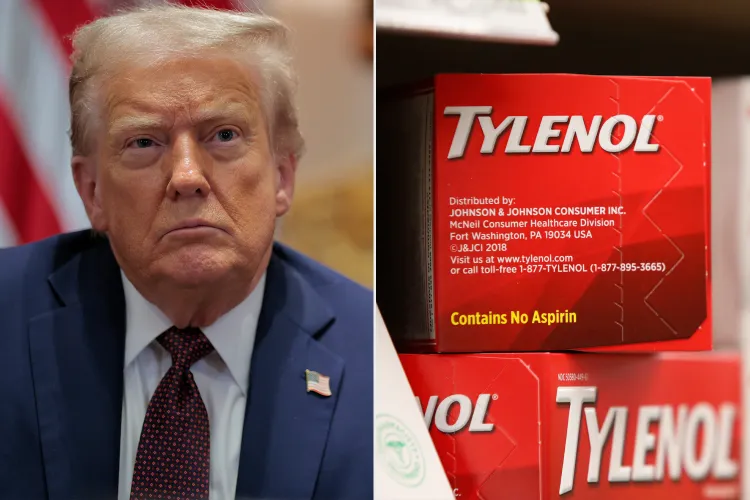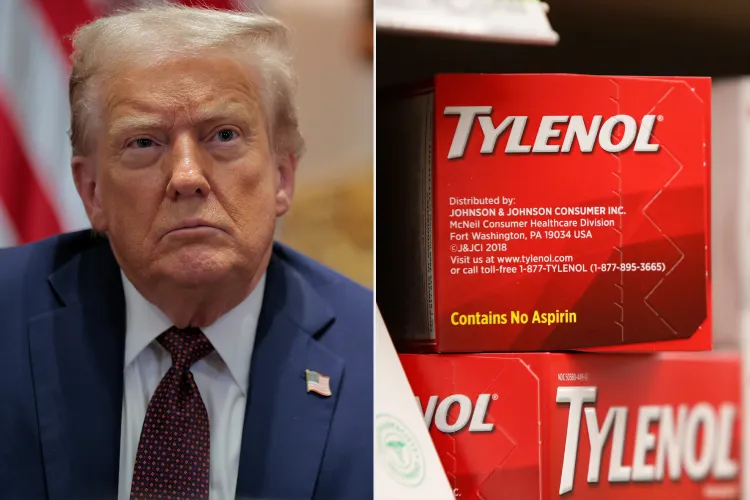Trump Claims Tylenol Causes Autism During Press Conference With RFK Jr. and Dr. Oz, Calling It “Life Is Common Sense”
The latest announcement from Donald Trump has left both supporters and critics buzzing, sparking heated debates across the country. In a press conference that gathered huge attention, Trump stood alongside Robert F. Kennedy Jr. and Dr. Mehmet Oz, declaring that Tylenol, one of the most widely used over-the-counter medications in the world, could be linked to autism when taken during pregnancy. His words, calling autism “horrible, horrible,” were blunt and emotional, and they triggered an immediate wave of concern from the medical community, researchers, and parents who rely on the medication for safe relief.

For decades, Tylenol—known generically as acetaminophen—has been considered one of the safer pain relievers, especially for pregnant women who are warned against using other drugs like ibuprofen. Trump’s statement that “life is common sense” while pointing to Tylenol as a cause of autism was dramatic and controversial. The comment was made with confidence, but without presenting clear new scientific data to back up the claim. That is what makes this moment so polarizing: the emotional weight of his words versus the scientific demand for evidence.
The medical and scientific community quickly responded with caution. Major health organizations, including the Centers for Disease Control and the American College of Obstetricians and Gynecologists, have repeatedly stated that while studies over the years have looked at acetaminophen use during pregnancy, no conclusive proof exists that ties it directly to autism. Some research has raised questions about possible associations, but experts stress that correlation does not equal causation. In simple terms, even if some patterns show up, it doesn’t mean Tylenol itself is the reason.

What Trump tapped into, however, is the deep fear many parents already live with. Autism has long been the subject of countless myths, rumors, and false claims, from the debunked vaccine theories to untested alternative treatments. Families dealing with the challenges of raising children on the autism spectrum often face overwhelming amounts of misinformation, and public figures repeating these claims only add fuel to the confusion. That is why Trump’s announcement hit like a thunderbolt—it carried the weight of a former president’s platform.
For some, his comments offered validation to fears they already held quietly. For others, especially doctors and scientists, it was another instance of dangerous misinformation gaining traction. Tylenol has been prescribed and trusted by millions, and questioning it without presenting solid data risks pushing pregnant women away from a medication that can be essential for managing fevers or pain. Ironically, untreated high fevers during pregnancy are themselves considered harmful for fetal development. This puts women in an impossible position, caught between fear and medical necessity.

What stands out about this moment is not just the medical debate, but the cultural one. Trump has always thrived in controversy, often saying things that shake up the establishment and leave people questioning what they thought was settled. By standing next to Robert F. Kennedy Jr.—a figure already known for his strong views on vaccines and health policies—and Dr. Oz, who has had his own controversies in the medical world, the press conference sent a clear signal: this was not a quiet scientific update. It was a bold, headline-grabbing statement meant to stir the pot.
In the days that follow, researchers will undoubtedly revisit existing studies, politicians will weigh in, and the public will continue to argue. But one thing is certain: the conversation around autism, pregnancy, and over-the-counter medications just changed dramatically. And for families, expectant mothers, and doctors, that shift will bring both confusion and pressure to seek clear, trusted guidance.



